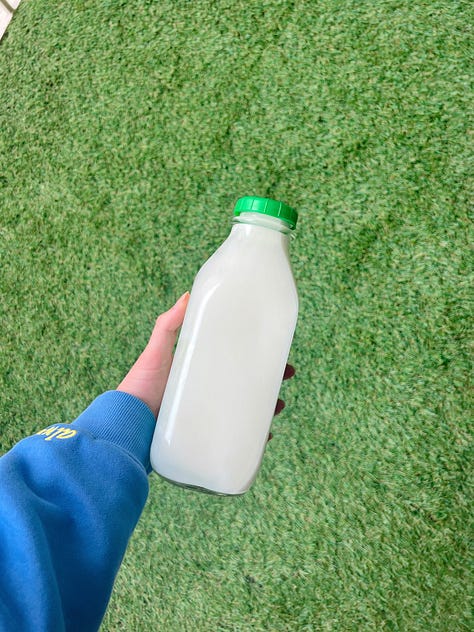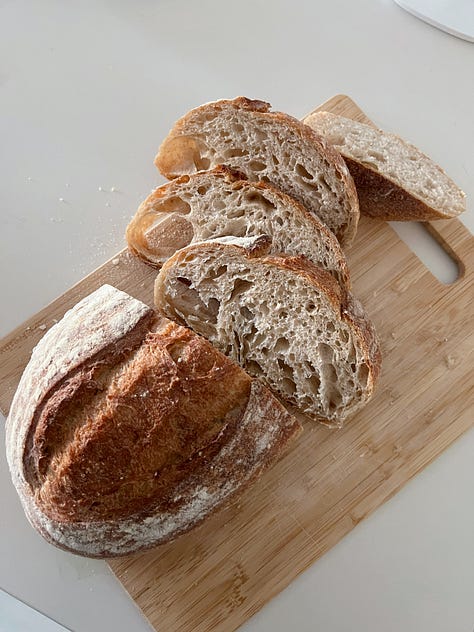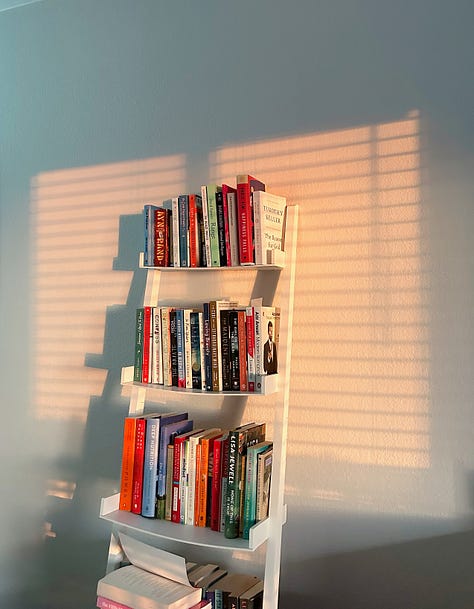I used to be in extreme pain every time I ate. Whether it was a salad, a smoothie, a bowl of soup, or something else entirely, I would end up bloated, gassy, uncomfortable, and completely drained of energy.
My symptoms started when I was in high school. They were pretty mild at the time, not extreme pain, but more uncomfortability than I assumed was normal. So I did what I thought was right and went to the doctor. At the time, they told me I should just cut out gluten and dairy, so I did.



As the months went on, my symptoms persisted. When I got to college, my symptoms kept getting worse. I was in the health center almost monthly, and each time I was dismissed. They told me I probably just had a UTI and I should take antibiotics (BTW — I had no UTI symptoms). I was prescribed a new batch of antibiotics every month, and at one point I just stopped taking them. I stopped going to the health center at all.
By the time my symptoms were the worst, I had cut out everything. No dairy, no gluten, no meat, no fodmaps, no histamines. No matter how “healthy” I ate, everything hurt. I was incredibly malnourished. I could barely eat without lurching over in pain, tossing and turning all night. I no longer got my period. I had trouble focusing, and I was wired and anxious at all times.
I learned to live with the pain. After being told over and over again that nothing was wrong with me, that I was making up the symptoms and I was fine, I started to believe that. Every time I felt pain, doubts flooded my mind. Was I just imagining this? I started to lose trust in myself, in my body.
These years of pain and dismissal formed this extreme distrust within my mind and body. I became disconnected from my intuition. I stopped listening to my body trying to communicate with me. Instead I tried to numb the pain and dismiss it. My body was desperately trying to communicate to me that something was imbalanced, and I kept trying to mute that.
One night I was in the hospital because of the pain. I spent hours getting tests done all throughout the night. By the time I was released in the morning, they told me nothing was wrong. I was so frustrated and exhausted. I was sick and tired of being told nothing was wrong after years and years of chronic pain. I knew something was.



So, I took matters into my own hands. I leaned deep into the world of holistic health. Spent hours doing research: reading, listening to podcasts, doing online courses. I talked with naturopathic, holistic, eastern and functional medicine doctors.
Once I fell into the depths of holistic health, my symptoms started to make sense. I learned I had SIBO, leaky gut, extreme inflammation, histamine intolerance, dysbiosis. All of these things compounded over time had caused a plethora of imbalances in my body. Now that I figured out what was wrong - it was time to figure out why these symptoms were occurring.
On The Menu:
Root Causes of Bloating
Comprehensive Guide of 20+ Tips and Tricks to Ease Bloat
How to Find a Doctor Who Listens and Takes a Holistic Approach
Disclaimer: I am not a doctor. None of this is medical advice. Just a fun discussion and conversation based on my personal experiences and learnings. Pls speak to a medical professional before starting anything new, every body is different. If you feel lost on where to begin, I recommend finding a functional or natural medicine doctor to deep dive into you.
Root Causes of Bloating
Bloating is common, not normal. When I was in college, I became fascinated with holistic health not only because of the pain I was dealing with, but because almost every single woman around me dealt with similar issues. None of them knew why, most of them were dismissed, so we all just learned to deal with it. Because it was so common, most of us assumed it was normal, but it is not!
Bloating is a signal from our body communicating to us that something is wrong. It can be as little as eating too much while in a rush, to something bigger like a bacterial overgrowth.
The Most Common Underlying Causes
Insufficient Stomach Acid
When stomach acid is low, food isn’t breaking down properly. This can cause poor digestion and absorption, which can also lead to food fermenting in your stomach, creating gas and bloating.
Taking antacids was one of the biggest mistakes I made when I was dealing with my gut issues. I was popping tums, gassex and nexium like they were candy. Antacids neutralize stomach acid. When stomach acid is low, this causes acid reflux and digestive issues, so although they may have short term relief, they are just making the problems worse long term.
Chronic Stress
When are bodies are in a sympathetic state (fight-or-flight), digestion shuts off. Our digestion shuts off because the body's priority shifts toward survival. Even though we are not physically being chased by a lion, the fight-or-flight response doesn't distinguish between real physical danger and perceived emotional or psychological stress. This response releases stress hormones like adrenaline and cortisol, redirecting energy and blood flow away from non-essential functions, like digestion, to organs and systems that help us react quickly — like the muscles, heart, and lungs.
Digestion becomes de-prioritized for a few reasons:
Energy conservation: Digesting food requires significant energy. In a stress response, your body conserves energy for immediate action (like fighting or fleeing) by reducing energy spent on digestion
Reduced blood flow to the digestive system: Blood is diverted away from the digestive organs and toward the muscles and brain to help you physically respond to the perceived threat
Slowed digestion and motility: The production of digestive enzymes and stomach acid is reduced, and gut motility (the movement of food through the digestive tract) slows down. This can cause feelings of bloating, indigestion, and stomach discomfort, as food isn’t broken down properly or moved efficiently through the digestive tract
In contrast, when you're calm and relaxed (in a rest-and-digest state, activated by the parasympathetic nervous system), blood flow returns to your digestive organs, and normal digestion resumes. So, chronic stress or being in a constant fight-or-flight mode can significantly impact digestion and contribute to bloating or other digestive issues. It is so important to actively tap into our parasympathetic (rest & digest) state in order for our bodies to function properly.
Additionally, stored trauma and emotional stress can contribute to bloating by triggering the body's fight or flight response. This state activates the sympathetic nervous system, inhibiting digestion and leading to issues like poor gut motility, imbalanced gut bacteria, and inflammation. Emotional stress can also increase cortisol levels, which may disrupt the digestive process, leading to symptoms like bloating. Addressing trauma and emotional health helps activate the parasympathetic system, allowing for better digestion and overall gut function.
Poor Eating Habits
How we it is just as important as what we eat. If we are not in a calm, rest and digest state when eating our bodies will not digest properly. Eating right before or right after a workout, eating quickly while in a rushed state, mindlessly eating, eating while distracted, overeating, not chewing our food, drinking a lot of liquid while eating can all alter how we digest food.
Our bodies also operate on a circadian clock, so when we eat is important. Eating a nourishing meal when we wake up helps signal to our digestive system that it is time to wake up and start operating. Same with our last meal. If we are eating super late at night, this is going to confuse our system and not allow us to get proper rest and digest to the best of our bodies ability.
Gut Dysbiosis
Gut dysbiosis refers to an imbalance in the gut microbiome, where harmful bacteria, fungi, or yeast outnumber beneficial microbes. This disruption can affect digestion, immune function, and overall health. An imbalance between good and bad bacteria in the gut can lead to fermentation of undigested food, causing gas and bloating.
There are a few different types of gut dysbiosis: loss of beneficial bacteria (for example from antibiotics), overgrowth of harmful bacteria (ex. SIBO), excessive presence of yeast or fungi (ex. Candida), or lack of microbial diversity.
Oftentimes this dysbiosis leads to things like leaky gut, which can cause food intolerances and inflammation in the body. When I had SIBO, I also had leaky gut and high inflammation. This led to me having tons of food and histamine intolerances. Once I solved the underlying issues, those intolerances and reactions went away.
Constant Poor Lifestyle Choices
Things like not getting quality restorative sleep, drinking a lot of alcohol, overusing antibiotics and over-the-counter drugs, eating a diet full of processed foods, being chronically stressed, not prioritizing sunlight and nature, constant screen time and consumption, being constantly sedentary, living in a negative mindset, can all lead to digestive upset.
After feeling bloated almost every day for years, I have developed a lot of tips and tricks when it comes to dealing with bloat - short term relief and also long-term.
These tips will support you whether you are dealing with a more serious diagnosis like I was, or if you are just dealing with some common bloat here and then.
Glow’s No-More-Bloat Guide
Keep reading with a 7-day free trial
Subscribe to Gut Feelings to keep reading this post and get 7 days of free access to the full post archives.




